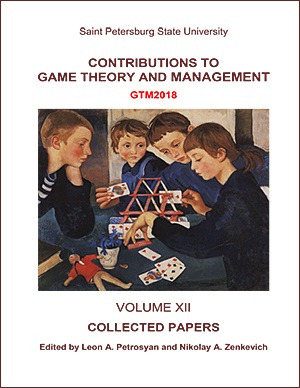Envy Stable Solutions for Allocation Problems with Public Resourses
Abstract
We consider problems of "fair" distribution of several different public resourses. If τ is a partition of a finite set N, each resourse cj is distributed between points of Bj ∈ τ. We suppose that either all resourses are goods or all resourses are bads. There are finite projects, each project use points from its subset of N (its coalition). A is the set of such coalitions. The gain/loss function of a project at an allocation depends only on the restriction of the allocation on the coalition of the project. The following 4 solutions are considered: the lexicographically maxmin solution, the lexicographically minmax solution, a generalization of Wardrop solution. For fixed collection of gain/loss functions, we define envy stable allocations with respect to Г, where the projects compare their gains/losses at fixed allocation if their coalitions are adjacent in Г. We describe conditions on A, τ, and Г that ensure the existence of envy stable solutions, and conditions that ensure the enclusion of the first three solutions in envy stable solution.
Keywords:
lexicographically maxmin solution, Wardrop equilibrium, envy stable solution, equal sacrifice solution
Downloads
References
Downloads
Published
How to Cite
Issue
Section
License
Articles of "Contributions to Game Theory and Management" are open access distributed under the terms of the License Agreement with Saint Petersburg State University, which permits to the authors unrestricted distribution and self-archiving free of charge.




